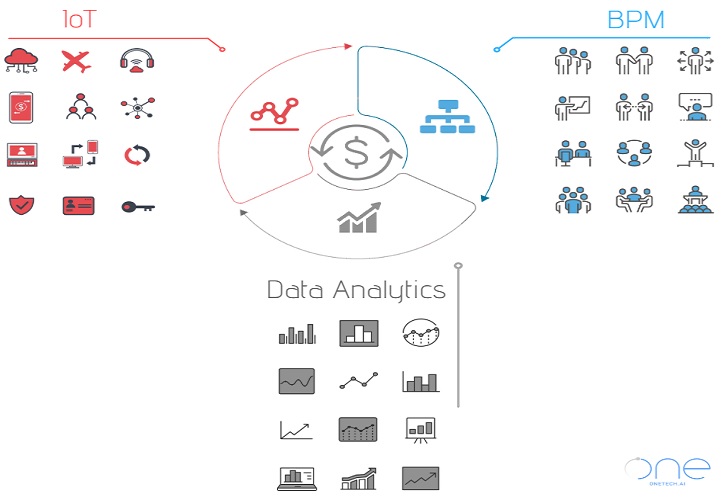
24 Aug What is BPM (Business Process Management)?
The definition of BPM, or Business Process Management, includes an insightful approach to establishing the processes of a business as a set of workflows. The goal of a BPM software is to enable system integration and business modeling techniques to increase workflow functionalities.
IoT Integration
Change is the only constant when it comes to business growth and BPM vendors recognizes this. Transforming a business’ processes both externally and internally will inevitably lead to a need for digital adoption of IoT, or Internet of Things, and data-driven practices. IoT permits the efficient connectivity between systems and devices so that aggregated data can be transformed into insightful analytics for the enterprise.
IoT includes many valuable “things” like smart electric meters, security alarms, automated devices, remote monitoring, and an almost unlimited amount of other electronics that enables data analytics (see Best Examples of IoT). Without these devices, the need for business processes to adapt to real-time scenarios would be heavily hindered. If a business can’t optimally access the potential of big data around them, it would almost be analogous to driving a car with a blindfold on – their business would be more prone to human error, inefficient use of time, and obvious lagging behind of leadership in their industry’s space.
Capabilities of BPM
Let’s talk about how these wonderful insights are gained through BPM and IoT adoption. There are a couple focus areas where the best capabilities from BPM vendors focus on such as adaptability, agility, analytics, connectivity, and management – with some vendors differing slightly on areas of expertise.
These BPM areas all incorporate different elements of value, from reducing production costs to optimizing asset and personnel performance. Here is a more comprehensive list of benefits for BPM integration with IoT:
- Automated Decision-Making
- Minimizing Human Error
- Predictive Analytic Models
- Improved Predictability
- Business Process Automation
- Data-Driven Processes
- Near Real-Time Tracking
- Asset Monitoring
- Integrated Data Sources
- Etc.
Future of BPM
The landscape of BPM vendors includes those who offer development tools, integration services, IT service support, and the like. However, the vendors that will stand out and achieve unparalleled insights for the enterprise will be those that incorporate current best practices with big data aggregation, advanced analytics, and automated business decision-making.
The commonality between these new features has to do with IoT and data analytics. Such features are incorporated into MicroAI’s Predictive Analytics Solutions Platform that offers these benefits to the enterprise and more. In conclusion, for enterprises and businesses that are looking to increase workflow efficiencies, reduce costs, and maximize outputs: adoption of intelligence processes and advanced data-gathering techniques is ideal.

